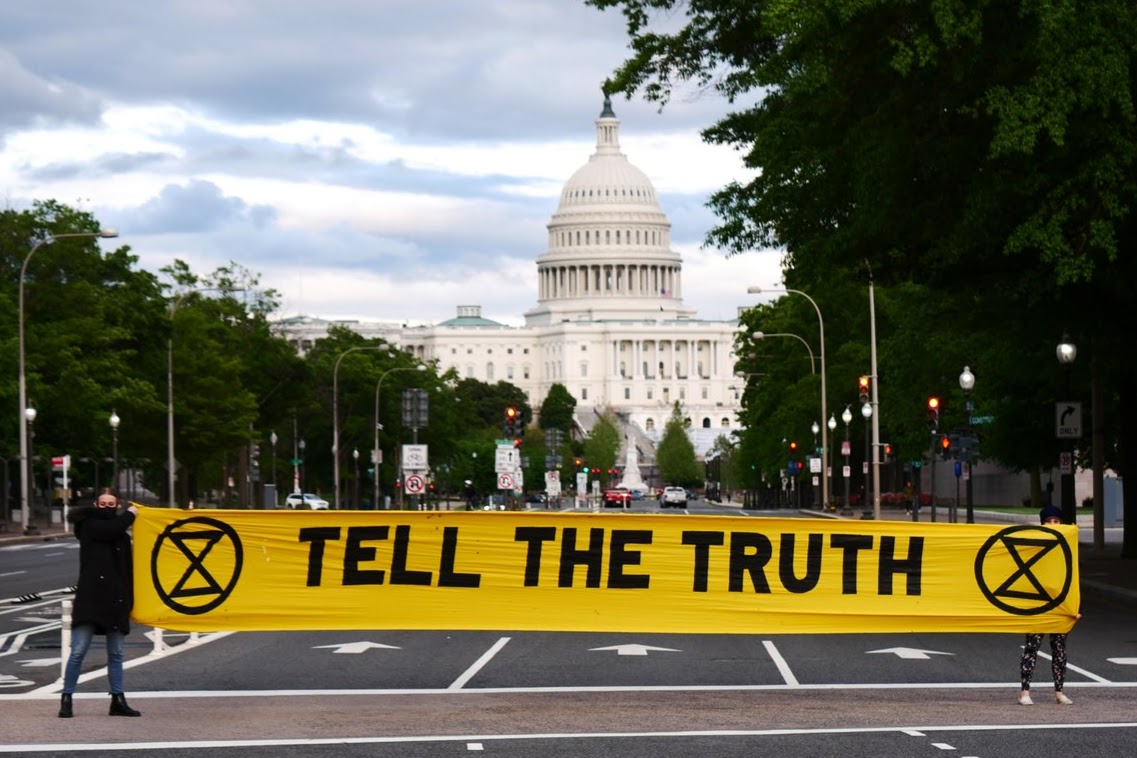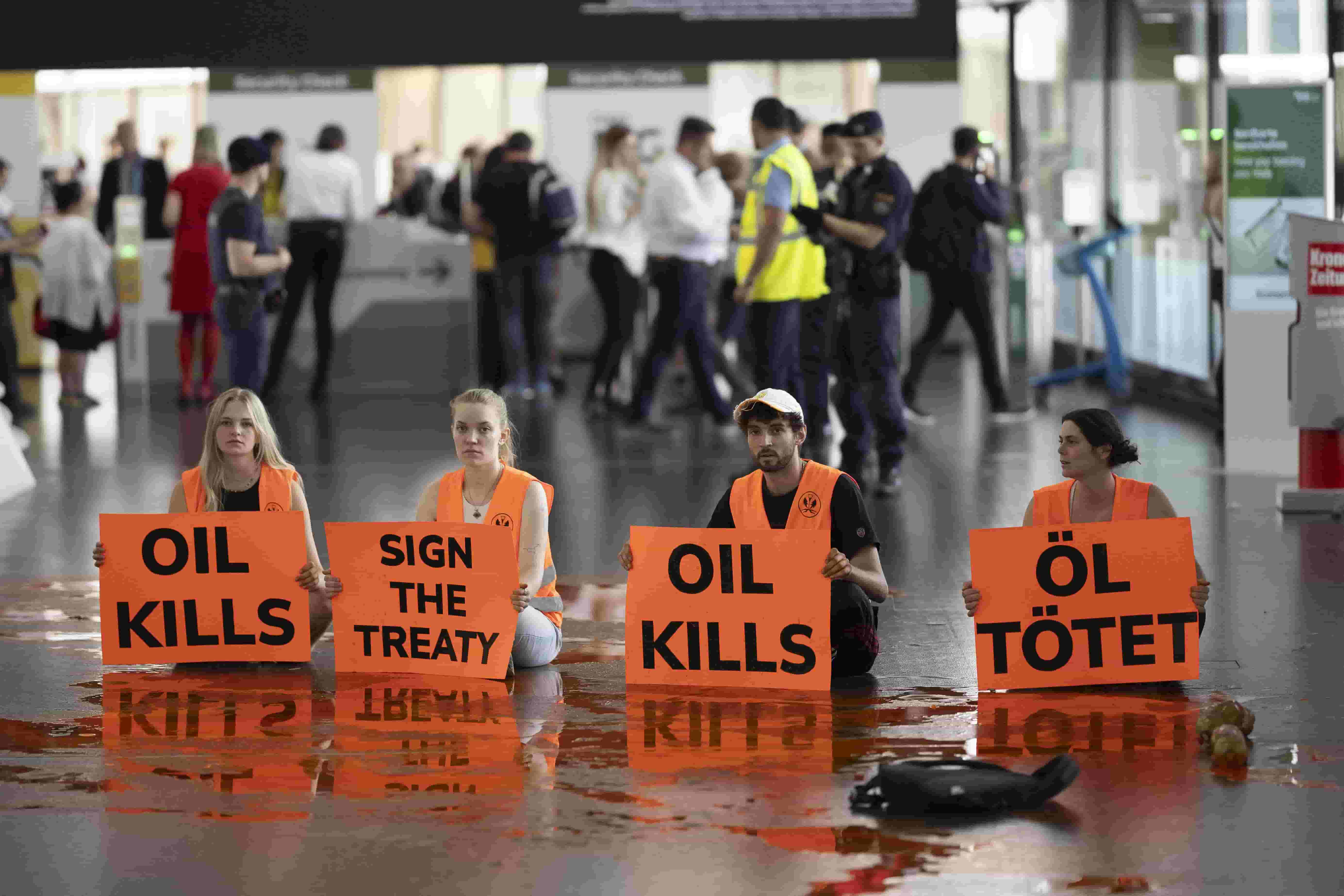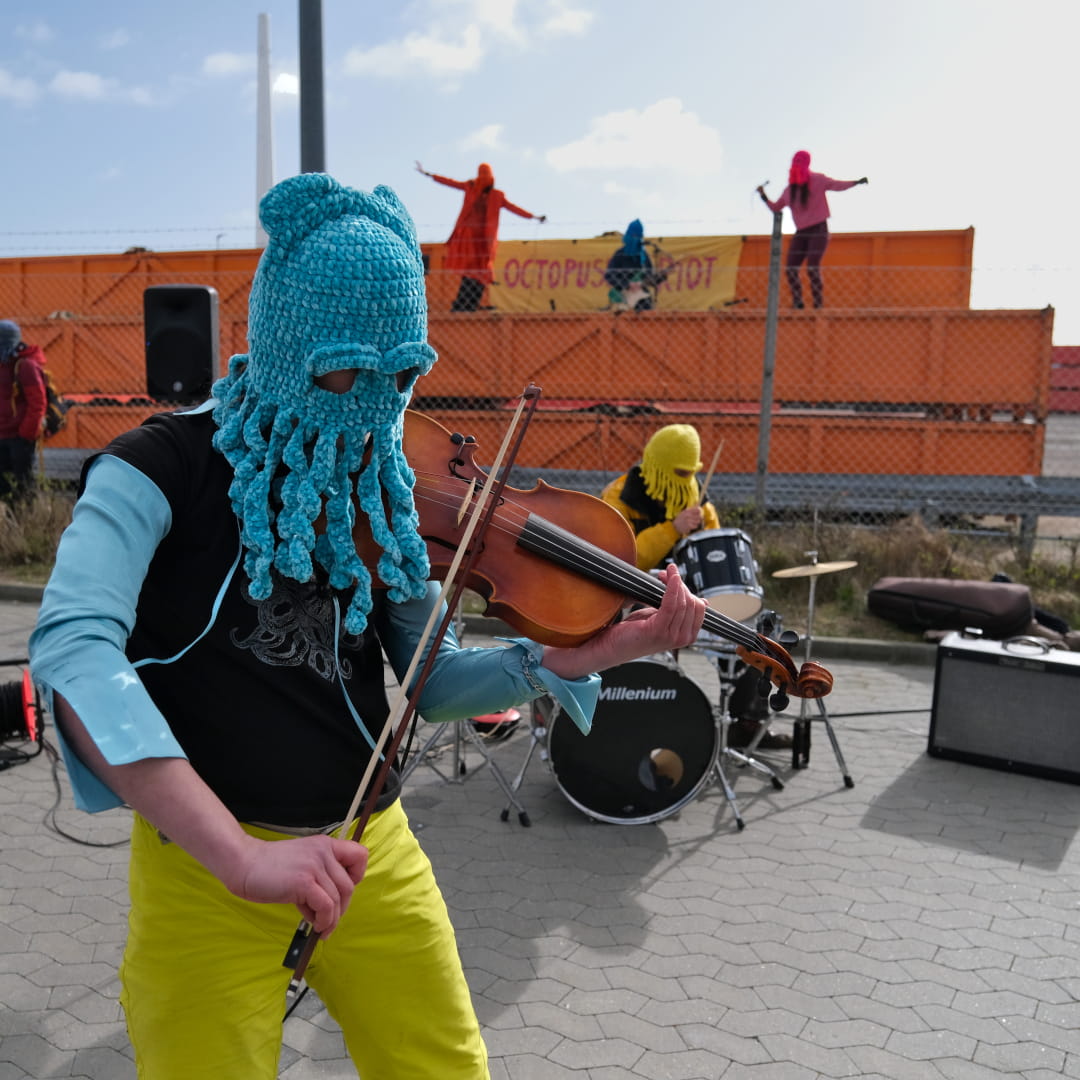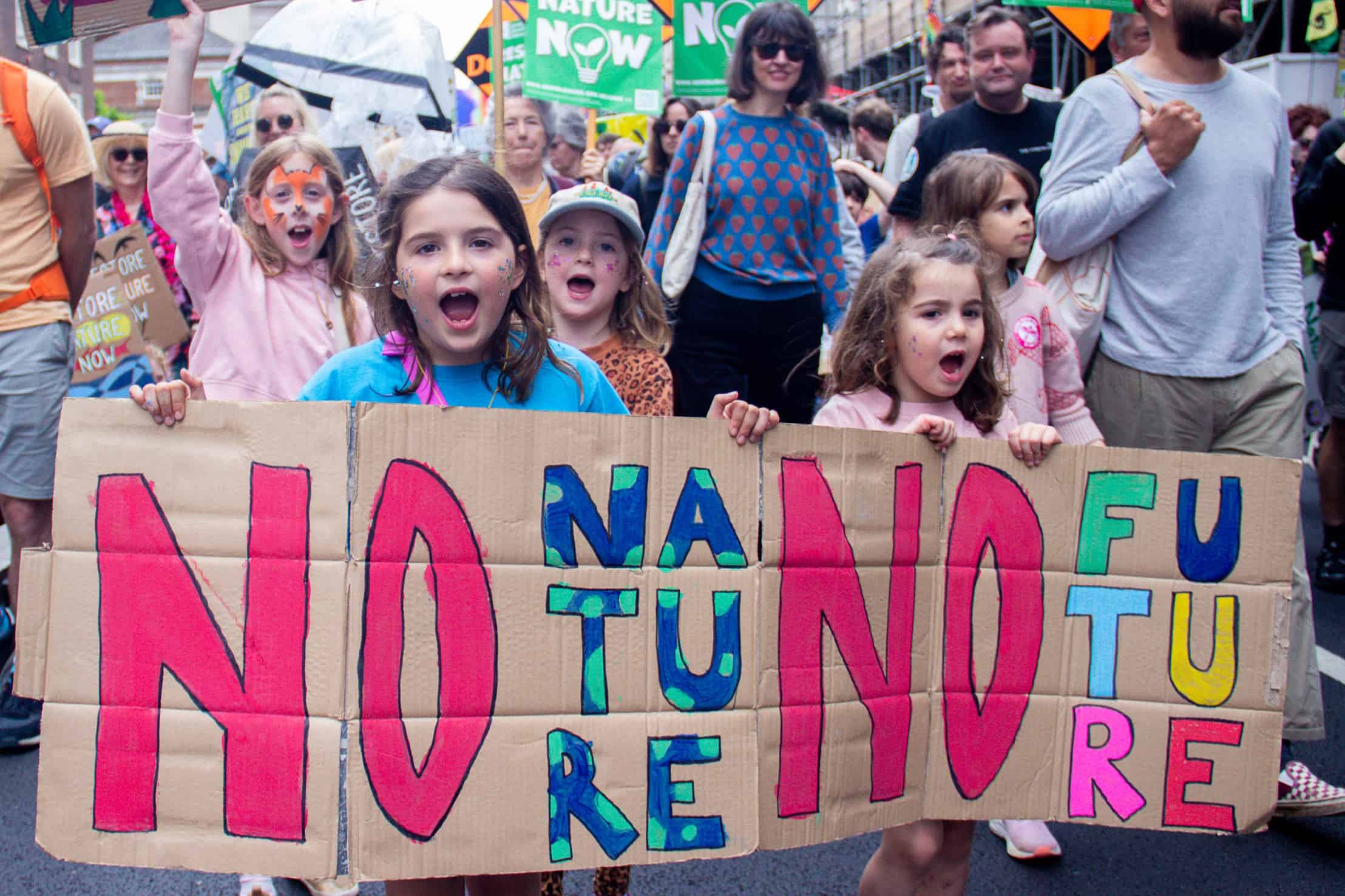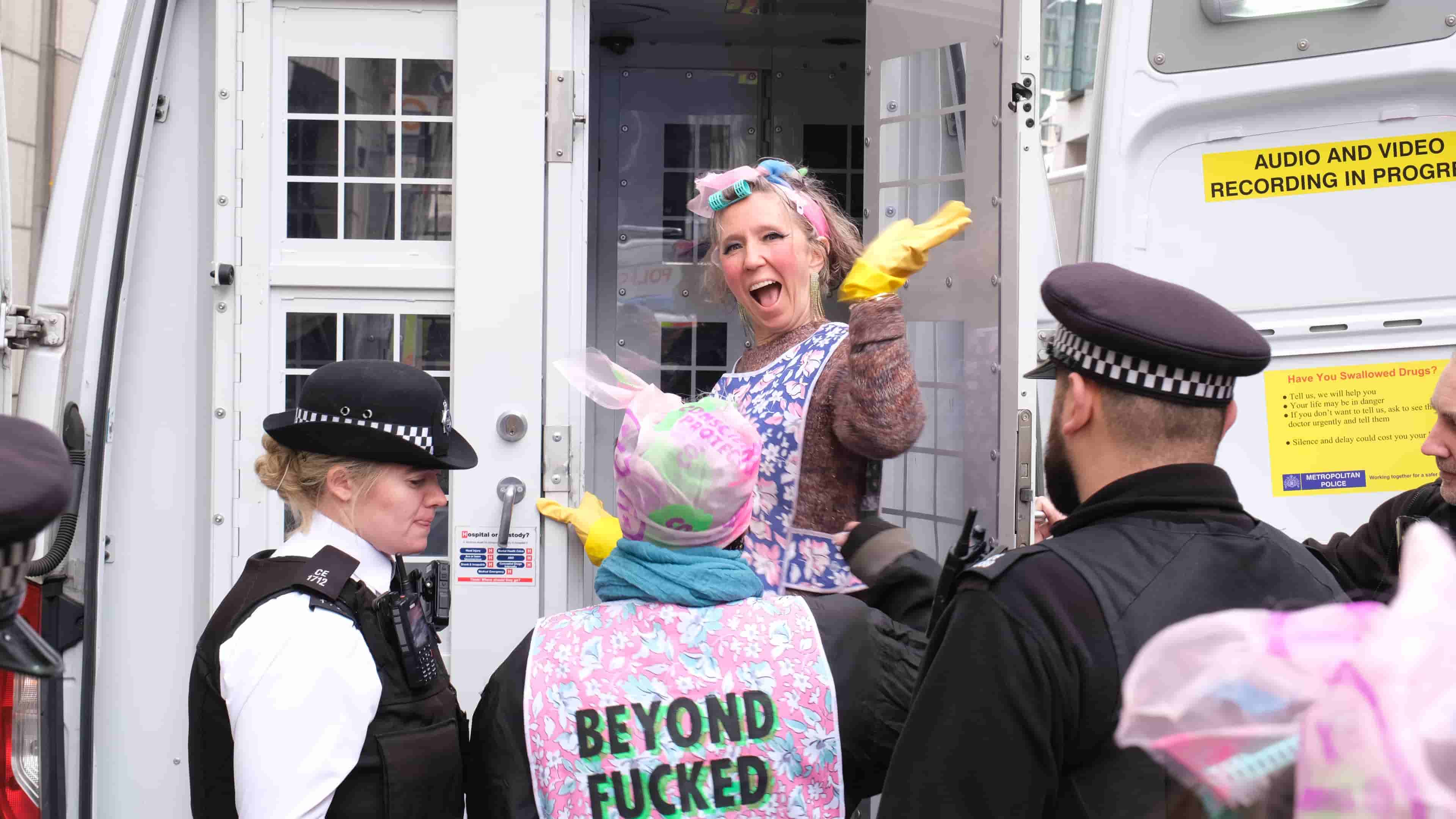
Protestors from all over the globe march together outside COP26. Photo: Gareth Morris
In this issue: Africa Rebels | COP-acabana in South America | Glasgow’s Mega Marches
Introduction
Dear rebel,
The first week of COP26 is over and the signs are not good. So far, this conference has not been the climate gamechanger promised by politicians and promoted by the media.
Each day brings a new pledge that looks like progress. But none are legally binding, few have stood up to scrutiny, and many offer so much wiggle room as to be meaningless.
The reality is that global carbon emissions are rapidly rising again after a Covid-induced slump, and rich nations are letting oil companies steer their decarbonisation strategies. We are not heading towards a brave new world, just using smallprint and tech-fixes to hold onto the old one.

A young UK rebel has the right message during the Global Day for Climate Justice.
In his opening speech to world leaders, the British prime minister likened their task in Glasgow to James Bond defusing a doomsday device. But the truth is that most of these leaders (not all) act like Bond villains, happy to watch the world burn rather than relinquish any of their ill-gotten power and prestige.
But we will not be picking over the puffed up promises of serial underachievers in this newsletter. Instead our focus will be on the glorious wave of COP-inspired rebellion that has swept across the Global South.
Africa and South America, regions that have long suffered the effects of extractivism and global heating, and have the most to lose from the grandstanding in Glasgow, have risen up like never before. Loving rage now courses from Kenya to Colombia, from Egypt to Argentina, and you can read all about it in Global South Action Highlights.

Rebels in Tanzania march to raise awareness about the climate crisis. Authorities made them remove their XR banners.
Loving rage has also been swirling around the COP conference itself, with rebels arriving from all over the world to take part in daily collective actions alongside folks from other movements. Find out more about the very best bits in COP Action Highlights.
You can also catch up on the wave of national rebellions that happened last month. Read a shocking report about police violence in the Netherlands, and how the Spanish Rebellion got unprecedented media coverage, in Rebellion Wave.
You can see some of the beautiful COP solidarity actions that have been taking place across every continent in Action Roundup. And finally, a rebel has somehow managed to burrow themselves into the conference centre and sent us a Postcard From COP.

A rebel from XR Vaal in South Africa has a simple message for her state power company.
We’ve never delivered a global newsletter more action-packed than this, and we’re only just getting started. Another COP-crammed issue will be with you at the same time next week.
As phoney pledges ring out, and global politics plummets to new lows, global rebellion reaches new heights and new corners of the globe.
This is what progress actually looks like.
Get involved in XR wherever you are! Check out our global website, learn more about our movement, and connect with rebels in your local area.
The Global Newsletter is brought to you by XR Global Support, a worldwide network of rebels that help new XR chapters grow. Read previous issues here.
We are in a crucial phase of human history, and we need money to make our message heard. Anything you can give is appreciated.
Contents
- Global South Action Highlights: Kenya, Tanzania, Rwanda, Uganda, Egypt, South Africa, Argentina, Colombia, Brazil
- COP Action Highlights: Trillion Dollar Bash, Greenwash March, Scientist Rebellion
- Action Roundup: China, USA, Australia, UK, Liberia, Italy, Sweden, Serbia, Mexico, South Korea, Belgium, Zambia.
- Rebellion Wave: Netherlands Rebellion, Spanish Rebellion
- Postcard From COP: Conference Week 1
Global South Action Highlights
Crimes Against Kisumu
23 OCTOBER | Kisumu County, Kenya
 XR Kisumu stand in the local market and hold up their ‘blood-soaked’ hands.
XR Kisumu stand in the local market and hold up their ‘blood-soaked’ hands.
When rebels and other activists set out on their 7km march across Kisumu County, they turned heads. They were flanked by acrobats, played upbeat music, and danced. But this was no carnival. The banner they carried read ‘Stop Killing Us.’
This was a rallying cry against the systematic exclusion of African countries from climate negotiations, and a demand for climate justice from those bearing the brunt of the crisis.
The rebels attracted so much attention as they journeyed through their local market that even some passing motorcyclists joined the march. But the rebellion nearly never happened.
In the days running up to it, the organisers received constant threats of police brutality. One rebel noted how climate activism could “easily get you killed,” citing the recent murder of Joannah Stutchbury, who campaigned against plans to build on a Kenyan national park.
 Rebels stay light-hearted despite the dangers of climate activism in Kenya.
Rebels stay light-hearted despite the dangers of climate activism in Kenya.
As well as fearing for their safety, rebels also faced incomprehension. “The majority of people don’t understand why you are making noise about something like greenhouse gas emissions,” said the rebel. They did their best to answer the questions of passersby.
In the last few years, Kisumu County has been hit by both severe flooding and drought. The floods have left families homeless, farms ruined, and schools closed.
Meanwhile the drought during this year’s farming season has left many local farmers facing the threat of starvation. Desperate rural communities have resorted to drawing water from contaminated sources, and disease is becoming more widespread.
One rebel based in Kisumu all her life said: “The climate emergency is a crime against humanity perpetrated by the rich and powerful against the poor and vulnerable, especially of the Global South. Let COP26 be the moment we stop speaking and start acting.”
Wake Up, Tanzania!
30 OCT / 6 NOV | Dar es Salaam, Tanzania
 Drummers lead the way through Dar es Salaam, the largest city in Tanzania.
Drummers lead the way through Dar es Salaam, the largest city in Tanzania.
XR Tanzania went on a courageous march to raise awareness about the climate crisis and demand action at COP26. It wasn’t long before the police stopped it.
They eventually allowed the march to continue, but with all banners removed to ‘keep the peace.’ Following discussions, XR have been granted permission for another march when banners will be allowed.
The majority of the country’s population has no concept of climate change, and like many governments, promises to tackle the issue have not yet resulted in policies.
Plastic pollution in Tanzania is a colossal problem. Plastic pollutants encourage the spread of pathogens such as cholera and malaria, contaminate food and water systems, and substantially reduce air quality when burnt, which is how many locals deal with the problem.
Yet, no measures are taken against the major plastic polluters of the region; multinationals like Coca-Cola, Nestlé, Pepsi-Co and Unilever, and local drinks producer Mo Enterprise.
The poor have no voice in Tanzania, but they do have ears. XR Tanzania believes that once the knowledge is out there, people will start demanding better.

XR Tanzania also organised a beach clean-up with young people for Global Action Day.
Rwandans Stand and Sing For Climate Justice
30 OCT | Muhanga City, Rwanda
Rwandan rebels took to the streets to demand action from the Global North governments who are responsible for the climate crisis and its lethal effects on the Global South.
They also performed a traditional dance and sang about conserving the nation’s forests, and the planet.

Rebels stand in a suburb of Muhanga, Rwanda’s 2nd largest city.
For the Rwandan people, the climate crisis is here and causing frequent devastation. Since 2018, the country has been experiencing extraordinary amounts of rainfall.
That year, storms, floods, and landslides damaged hundreds of roads and bridges, displaced nearly 16,000 families, and killed 254 people. In the first four months of 2020, flooding and landslides displaced thousands more families and took at least 140 more lives.
The extreme weather costs Rwanda nearly 10% of its national budget each year, and the losses hit rural communities, small-scale farmers, and low-income families the most.
 Rwanda is being courted by the oil industry for a major pipeline project across East Africa.
Rwanda is being courted by the oil industry for a major pipeline project across East Africa.
XR Rwanda is calling for a new climate crisis fund to be financed by wealthy countries as well as by taxes on financial transactions, international air travel, and fossil fuels.
Funds would be disbursed to both government and civil society organizations, especially the locally-based and women-led ones that can reach those most affected.
XR Rwanda hopes COP26 will put a spotlight on those countries responsible for these climate disasters and trigger decisive action that addresses loss and damage.
No Oil, No Sugar: Just Clean Water!
30 OCT, 4 / 5 NOV | Iganga, Hoima, & Jinja, Uganda

Rebels in Hoima, home to Uganda’s burgeoning oil industry, send a clear message to COP.
Rebel groups across Uganda have launched distinct actions to draw attention to major environmental issues in their regions.
In the eastern town of Iganga, rebels marched to raise awareness about water pollution caused by local steel factories.
Families living near the factories are forced to inhale dense smoke, and factory waste floods the sewer system and spills into water sources. Many locals have to travel over half an hour to access safe drinking water.

Some Iganga rebels wore masks for protection - activism can be dangerous in Uganda.
Only half of Uganda’s people have basic access to safe drinking water, and a fifth are forced to drink from streams, ponds, and hand-dug wells, which are often contaminated due to the widespread absence of proper toilets and showers.
The loss of vegetation, which acts as a natural filtration system, has increased water-related health issues. Nearly a quarter of deaths under the age of five in Uganda are a result of diarrhoea due to polluted water.
To the west in Hoima, home to Uganda’s oil reserves and soon to house its only refinery, rebels called on COP26 leaders to leave fossil fuels in the ground, and called upon local leaders to stop the destruction of local forests. Trees are being felled for charcoal and timber at such a rate that conflicts between stressed wildlife and locals are increasing.

XR Great Lakes stand in one of the region's many sugarcane fields.
Finally, in the southern city of Jinja, which overlooks Lake Victoria, XR Great Lakes launched an awareness campaign about sugarcane and how its production in the wetland region is leading to food insecurity.
The water-intensive crop remains in the soil all year long and is terrible for biodiversity. But money talks. Sugarcane is now a source for biofuels and bioplastics as well as food production, and the global market is booming. Sugar factories operate across the region, and local farmers are abandoning traditional food crops.
The industrialisation of the area is leading to increased concrete cover and flooding, as well as increasing the threat of eutrophication in Lake Victoria.
XR Egypt celebrates ‘Green Sunday’
7 NOV | Alexandria, Egypt

Members of an Engineer club attended the workshop (alongside students and children).
XR Egypt and local group Green Society Initiative held a workshop to inspire young and old Egyptians to fight for climate justice.
The event was joint-led by a nuclear engineer and a visual artist, and the turnout was both large and multigenerational.
Participants didn’t just sit and listen, they constructed puzzles together which depicted the multifaceted nature of the climate crisis, the array of solutions available (with a particular emphasis on nuclear energy), and the ways we as individuals can bring about change.
 Attendees solve a puzzle which depicts an area of the climate crisis.
Attendees solve a puzzle which depicts an area of the climate crisis.
Many who hold political office in Egypt have indulged in climate denialism and action has been far too slow.
XR Egypt believes that the delegates at COP26 need to abandon empty promises and begin a global transition to clean (specifically nuclear) energy. They also have plans for more awareness actions in their community soon.
Rebels Fight Extraction in South Africa
29 OCT / 3 NOV | Johannesburg, South Africa
 Eskom uses coal to generate electricity, which pollutes the area and drives extraction.
Eskom uses coal to generate electricity, which pollutes the area and drives extraction.
Activists from XR Vaal and Botle Ba Tlhaho Environmental Group want a just transition to renewable energy, and so they targeted state energy company Eskom, which uses coal to generate 90% of the nation’s electricity.
A dozen rebels assembled outside Kwaggastroom train station to sing, wave banners, and demand that Eskom go renewable, or go to hell!
Eskom is just one of many companies driving extraction in the Vaal triangle (an industrial area rich in natural resources). Acid mine drainage, air smog, and deforestation have been rife for decades.

XR Vaal also held a protest against EACOP, a pipeline that will run hot crude oil across East Africa, oil drilling in the Okavango Delta, and other crimes by extractive industries.
The region became an official government cleanup priority in 2007, but little has been done with taxpayer money since, and extractive industries have still not been held accountable.
The fact that these industries remain one of the few reliable local sources of employment complicates the issue. This is why XR Vaal wants industry to decarbonise and usher in sustainable alternatives.
Together with regenerative agriculture and reforesting, rebels believe that their region can heal from decades of extraction.
Festivals, Flyers, Fossil Fuels: South America’s COP-acabana
30 - 31 OCT | Buenos Aires, Argentina 27 OCT / 6 NOV | Bogotá, Colombia 5 NOV | Uberlândia, Brazil
 Music and passion were always the fashion at the Tierra Activa Festival, Buenos aires.
Music and passion were always the fashion at the Tierra Activa Festival, Buenos aires.
Rebels in Buenos Aires hosted a weekend festival, the Tierra Activa, to mark the start of COP26. There was music, theatre, activities for children, and a citizens assembly at the end of each day.
A special program of talks covered Argentina’s political inaction over the climate crisis, the government’s cosy relationship with multinational corporations, and the extractivism and indigenous persecution that has resulted.
Mega dams have altered river flows and destroyed biodiversity. Mega-mining projects compete with communities in Catamarca, Jujuy, Mendoza and Chubut for water resources. Forests and wetlands are razed to make way for soya plantations and cattle ranches, and rivers are depleted to keep exports flowing.

For the finale, the boxes broke open to reveal what was inside the leaders’ heads. The answer: money, toxic chemicals, and blood.
Colombian rebels loaded with flyers, brushes and glue ran through the moonlit streets of Bogotá and pasted messages on banks, bus stops, and billboards to spread XR’s message and preview their next action (tagline: “The world is in flames and you are on vacation”).
The action turned out to be a performance where world leaders treated COP like a holiday and mocked activists. “Colombian government representatives go to the COP with a very different goal than tackling the climate crisis”, said a rebel from XR Bogotá. “They go to do commercial diplomacy, meaning more fracking and more mega-mining”.

XR Uberlândia and FFF come together to celebrate an action well done.
Finally, Brazilian rebels and Fridays For Future activists distributed their own flyers to the car drivers of Uberlândia. The fossil fuel awareness campaign was launched during rush hour on the city’s biggest road, and finished with an artistic performance involving kayaks to show motorists how without decarbonised transportation, the city could end up underwater.
COP Action Highlights
Glasgow Spirit Sparks Global Solidarity
30 OCT - 6 NOV | Glasgow, Scotland
A record-breaking week of protest started gently in Glasgow, with rebel pilgrimage groups wandering into the city after setting off from as far afield as Sweden, Germany and Poland. Waiting to welcome them was XR Scotland’s Blue Rebels, the Serpent of Capitalism (a giant 30m long sculpture), and a Samba band.
Next to arrive were the Red Rebels, this time by train, and again the Blue Rebels were there to greet them. The two beautiful brigades joined in a silent and haunting procession around Glasgow Central station to celebrate.
And while world leaders welcomed one another at a lavish opening dinner party, rebels joined other climate activists at a beggars banquet rally in a park just outside.

Greta at the beggars banquet rally, the Serpent of Capitalism at the Pilgrim’s Procession, the greenwash march where police kettled 500, and suffragettes outside JP Morgan.
With the welcomes out of the way it was time for a proper party. A Trillion Dollar Bash was held outside JP Morgan, the worst bank of them all when it comes to profiting from fossil fuels. But the vibes were so good that rebels had to move, so they marched to the “Squinty Bridge” outside the COP26 Blue Zone and occupied it. It was the first big march of many.
The indigenous leaders of Minga Indigena marched to the conference centre with rebels alongside them, and demanded an end to offsetting and carbon trading - false solutions that will ensure the continued destruction of their communities.
 Minga Indigena are a coalition of Indigenous leaders from all over the world.
Minga Indigena are a coalition of Indigenous leaders from all over the world.
A greenwashing march was joined by over 1000 activists, though half of them were kettled by overzealous police for two hours, and five lock-ons were arrested for barricading the HQ of Scottish energy company (and COP26 sponsor) SSE.
Rebels showed solidarity with war and climate refugees on a march for peace, highlighting how the UK government spends more on weapons than climate solutions, how climate chaos will lead to more war, and how arms companies like BAE will profit from it.
30,000 joined the Youth Climate Strike March organised by Fridays For Future Scotland, and listened as Greta declared COP26 a failure. But the jewel in the marching crown came the next day, when a staggering 100,000 people coursed through Glasgow for the COP26 Global March.
 Scientist Rebellion chain themselves to King George V bridge then break records.
Scientist Rebellion chain themselves to King George V bridge then break records.
It proved to be one of the largest protests in Glasgow’s history, and it wasn’t the only record made that day. Twenty-one scientists were arrested for occupying a bridge for three hours - the largest number of scientists ever arrested for a climate direct action!
If you’re a rebel in Glasgow be sure to check out this legal advice (or this one for non-UK visitors) and this regen guidance. XR Scotland is struggling to house rebels and retain venues after host cancellations and police threats. Help them recover costs by donating.
Watch COP26.tv for daily coverage of all the action inside and outside the conference!
Action Roundup

21 OCT | Beijing, China: XR China visits the Great Wall for their first action. Huānyíng!
 25 OCT | NYC, USA: XR NYC and Sunrise Movement NYC blockade two highways during morning rush hour traffic. Rupert Murdoch wasn’t pleased.
25 OCT | NYC, USA: XR NYC and Sunrise Movement NYC blockade two highways during morning rush hour traffic. Rupert Murdoch wasn’t pleased.

27 OCT - 6 NOV | Melbourne, Australia: Victoria state is rebelling. Highlights include a rally outside parliament, a blockade of ExxonMobil, a bridge occupation, and a 4m tall screaming koala called Blinky who will haunt your dreams.
 27 OCT - 4 NOV | Worcestershire, Southampton, London, UK: Rebels blockade the entrance to an Arms Fair, occupy an Exxon refinery due for expansion, hold a vigil outside the Bank of England for the Pacific Islands, and protest outside Standard Chartered bank.
27 OCT - 4 NOV | Worcestershire, Southampton, London, UK: Rebels blockade the entrance to an Arms Fair, occupy an Exxon refinery due for expansion, hold a vigil outside the Bank of England for the Pacific Islands, and protest outside Standard Chartered bank.
Photo: Reya Wood, Crispin Huges, Denise Laura Baker
 30 OCT | Monrovia, Liberia: XR Liberia’s first ever action. Welcome to the rebellion!
30 OCT | Monrovia, Liberia: XR Liberia’s first ever action. Welcome to the rebellion!
 30 OCT | Rome, Italy: Rebels had to contend with riot police as they blockaded roads and locked themselves to railings to disrupt the G20 summit that directly preceded COP26.
30 OCT | Rome, Italy: Rebels had to contend with riot police as they blockaded roads and locked themselves to railings to disrupt the G20 summit that directly preceded COP26.

31 OCT | Stockholm, Sweden: Rebels boarded aircraft, sat on runways, and glued themselves to planes across the country. 8 flights in 8 airports were blocked.

1 NOV | Belgrade, Serbia: Rebels dressed as Shell, Coca-Cola, Nestlé, and a ‘political leader’ burn planet Earth after a cycling protest that passed most major embassies.
 5 NOV | Mexico City, Mexico: Rebels used graffiti, fake-blood, and chants to demand that ecocidal companies Bayer (pharmaceuticals) and Monsanto (agrochemicals) leave Mexico.
5 NOV | Mexico City, Mexico: Rebels used graffiti, fake-blood, and chants to demand that ecocidal companies Bayer (pharmaceuticals) and Monsanto (agrochemicals) leave Mexico.

6 NOV | Seoul, South Korea: XR Korea stage an Earth Mukbang (Eating) Contest! Which multinational corporation do you think guzzled the most?
 6 NOV | Brussels, Belgium: More than 250 rebels were arrested for trying to peacefully protest outside the Federal Parliament.
6 NOV | Brussels, Belgium: More than 250 rebels were arrested for trying to peacefully protest outside the Federal Parliament.
 6 NOV | Lusaka, Zambia: Rebels take their COP26 message to the streets.
6 NOV | Lusaka, Zambia: Rebels take their COP26 message to the streets.
Rebellion Wave
Defiant Dutch Withstand Police Brutality
11 - 18 OCT | The Hague, Netherlands
Rebels suffered brutal treatment from police over their week of rebellion, with female and non-binary rebels receiving the most aggression (Warning: linked videos are upsetting).
One rebel was thrown into a police bus so violently they hit a window and passed out, another was beaten on the hand with a hammer, and still more rebels were violently detached from blockades, and dragged down the street, in some cases by the hair.

A rebel chained to a log is aggressively detached by police. Photo: Frank van Deutekom
XR Netherlands condemned the police crackdown and said violence should never be the answer to peaceful demonstrations.
The rebellion launched with more than 700 brave rebels blockading a major intersection that lies right between the Dutch Parliament and its Ministry of Economics & Climate. Dozens of other rebels used tripods to occupy smaller locations around the capital.
The police were present in large numbers, but at first the vibe was good. As the light faded though the police started violently herding together rebels, bystanders and journalists alike. 200 rebels were surrounded and 80 arrested and bundled into vans.
 The FLINTA brigade stands defiant in the political heart of the Netherlands.
The FLINTA brigade stands defiant in the political heart of the Netherlands.
150 brave rebels returned to occupy the same intersection the next day. This time the centre of the blockade was made up of FLINTA (Female, Lesbian, Intersex, Non-binary, Trans and Agender) rebels, and the police violence was instant.
A FLINTA temple with a ‘toxic system’ roof propped up by columns representing patriarchy, colonialism, and capitalism was immediately confiscated, while rebels were subject to brutal police intimidation, including being pulled to the ground by their hair.
 Rebels outside the HQ of a political party set to eventually form a coalition government.
Rebels outside the HQ of a political party set to eventually form a coalition government.
Dozens of rebels used glue, fake-blood, and determination to blockade the offices of the three political parties who are likely to form the nation’s next coalition government - and none of whom are willing to put much effort into climate policy.
Another ten occupied the foyer of Dutch oil and gas lobby group, NOGEPA and demanded that they lobby instead for sustainable energy.
The Netherlands has one of the highest per-capita CO2 emissions figures in the European Union and a government that has been happy to greenwash itself. XR is one of few environmental groups in the region trying to pressure the government into action.
A Memorable Week on Madrid’s Streets
18 – 25 OCT | Madrid, Spain
Dancing in the streets, ministry occupations, guerilla advertising, and major traffic blockades--the rebellion in Madrid was a week to remember. It drew in rebels from all over Spain, as well as vans of police and daily press headlines.
Around 50 rebels launched the rebellion in style with some drum-based 'discobedience', but then came three actions targeting the Spanish government.

A young rebel takes part in a bloody performance outside Spain’s Congress
Rebel scientists and academics denounced the political inaction around the climate crisis by pasting pages of the latest IPCC Assessment Report on the walls of the Ministry of Ecological Transition. They also sprayed “Red Alert” across the ground with fake blood.
Four rebels chained themselves to the nearby Ministry of Foreign Affairs to demand Climate Justice for the Global South, and XR Youth put on a performance outside Congress to remind parliamentarians whose future is really at stake.
Spain’s corporate sector was also targeted. Rebels cleverly hacked a giant bank advert in the city center, while around 50 members of Animal Rebellion Spain swarmed a McDonald’s to raise awareness about the cruelty of the meat industry. Passersby applauded and wanted to know more.
XR Spain joined forces with Marea Deliberativa, a coalition of environmental and social groups, to launch a Climate Assembly in front of Spain’s national gallery of modern art, and highlight the major flaws of the official Spanish Climate Assembly.

The final day blockade gathered rebels from all over Spain. Photo: @Mingo_Graphics
A nationwide ‘Rebellion of One’ saw vulnerable rebels sit in busy roads not just in Madrid but in other cities including Valencia and Mallorca. As always, reactions were mixed, but when one rebel shouted he didn't want to be there, a pedestrian ran over to give him a hug.
The rebellion closed with a 150-strong blockade of one of Madrid's busiest streets, with the crowd demanding that this COP be the last. The biggest action of the rebellion attracted ten van loads of police, who then used radial saws to cut free and arrest rebels who had locked themselves to a giant hourglass and pink oil drums. It also attracted unprecedented media coverage across Spain’s mainstream press and TV channels.
Postcard From COP
Paradise Lost at the Climate Carnival
1 - 6 NOV | COP26, Glasgow, Scotland
The planet’s yearly date with climate angst is halfway spent, and humanity’s tango with calamity plays out inside conference halls and out on the streets.
Some 25,000 visitors from all corners of the Earth have descended upon Glasgow. Those visitors out on the streets mingle with local activists and engage in daily protests, culminating in Saturday’s huge march.
Inside the conference sit the powerful world leaders and their negotiators, and this week they produced a series of agreements and pledges.

Inside the COP26 Blue Zone, where world leaders come to negotiate. Photo: Ian Scoones
There were a few (tepid) surprises, like India and Saudi Arabia’s unexpected commitments to net zero. Even though they fall short of the recommendations by the UN’s own experts at the IPCC, these announcements seem to give delegates and journalists a fleeting sense of hope.
More than 100 nations pledged to cut global methane emissions by over 30% by 2030, and a forestry agreement promised to stop deforestation by the same year. Deals to curb the use of coal once and for all, and encourage divestment from fossil fuels, were also unveiled.
But the glaring lack of policing mechanisms left a question mark hanging over all of it. These nations could easily promise the Earth while continuing to destroy it.

Outside on the streets of Glasgow, where the city pulses with protest. Photo: Gareth Morris
In general, the solutions presented at this COP never stray far from the path of “green capitalism”, and that is simply unacceptable to those visitors chanting outside. They call for an entire overhaul of the global economic system to avert the abyss we face.
At least both sides can agree that it is an abyss we face.
As the second week of COP begins, and protest blossoms across the world, it feels like the real value of this climate carnival lies not in its outcomes, but in the stage it sets for global voices to speak up.
Thank you

Scottish rebels young and old have done themselves proud while their nation hosts COP26.
Our next issue is already shaping up to be something special, rebel. We’re covering actions in Nigeria, Ecuador, Congo, Brazil, Gambia and more - and it’s out just one week from now.
Thank you for reading, rebel. If you have any questions or feedback, we want to hear from you. Get in touch at [email protected].
We are in a crucial phase of human history, and our movement needs money to make our message heard. Anything you can give is appreciated.

